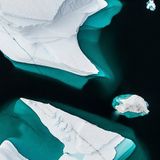RECENT ARTICLES

Climate change may have had 'key role' in pandemic: study
Climate change may have played a "key role" in the transmission of the novel coronavirus to humans by driving several species of pathogen-carrying bats into closer contact, research showed on Friday.The virus, which has killed more than two million people and caused unprecedented global disruption, is thought to have originated in bats in Southeast Asia.Researchers from the University of Cambridge used temperature and rainfall data over the last 100 years to model populations of dozens of bat species based on their habitat requirements.They found that over the last century, 40 species had...…Climate change may have played a "key role" in the transmission of the novel coronavirus to humans by driving several species of pathogen-carrying bats into closer contact, research showed on Friday.The virus, which has killed more than two million people and caused unprecedented global disruption, is thought to have originated in bats in Southeast Asia.Researchers from the University of Cambridge used temperature and rainfall data over the last 100 years to model populations of dozens of bat species based on their habitat requirements.They found that over the last century, 40 species had...WW…

Ice Loss Will Trigger Increased Warming in a Vicious Feedback Loop, Study Warns
The loss of billions of tonnes of ice from Earth's frozen spaces is likely to increase global temperatures by an additional 0.4 degrees Celsius, highlighting the danger of a "vicious circle" of warming. Arctic summer sea ice levels have declined by more than 10 percent each decade since the late 1970s and mountain glaciers have shed roughly 250 billion tonnes of ice annually over the last century.Ice loss from the West Antarctic and Greenland ice sheets is accelerating and already outstripping what scientists until recently believed to be the worst-case melt scenarios.Decades of...…The loss of billions of tonnes of ice from Earth's frozen spaces is likely to increase global temperatures by an additional 0.4 degrees Celsius, highlighting the danger of a "vicious circle" of warming. Arctic summer sea ice levels have declined by more than 10 percent each decade since the late 1970s and mountain glaciers have shed roughly 250 billion tonnes of ice annually over the last century.Ice loss from the West Antarctic and Greenland ice sheets is accelerating and already outstripping what scientists until recently believed to be the worst-case melt scenarios.Decades of...WW…

Global warming to cause 'catastrophic' species loss: study
AdvertisementPARIS, FRANCE --Global warming will cause "catastrophic" biodiversity loss across the world if greenhouse gas emissions aren't curbed, with some ecosystems liable to collapse as soon as 2030, according to new research into where and when die-offs may occur.Earth has never in human history warmed so quickly or uniformly as currently, but a variety of factors affect temperatures in individual regions, with significant seasonal and geographic variation.Scientists predict that at the current level of manmade carbon emissions, Earth is on course to heat up to four degrees Celsius by...…AdvertisementPARIS, FRANCE --Global warming will cause "catastrophic" biodiversity loss across the world if greenhouse gas emissions aren't curbed, with some ecosystems liable to collapse as soon as 2030, according to new research into where and when die-offs may occur.Earth has never in human history warmed so quickly or uniformly as currently, but a variety of factors affect temperatures in individual regions, with significant seasonal and geographic variation.Scientists predict that at the current level of manmade carbon emissions, Earth is on course to heat up to four degrees Celsius by...WW…

Global warming to cause 'catastrophic' species loss: study
AdvertisementPARIS, FRANCE --Global warming will cause "catastrophic" biodiversity loss across the world if greenhouse gas emissions aren't curbed, with some ecosystems liable to collapse as soon as 2030, according to new research into where and when die-offs may occur.Earth has never in human history warmed so quickly or uniformly as currently, but a variety of factors affect temperatures in individual regions, with significant seasonal and geographic variation.Scientists predict that at the current level of manmade carbon emissions, Earth is on course to heat up to four degrees Celsius by...…AdvertisementPARIS, FRANCE --Global warming will cause "catastrophic" biodiversity loss across the world if greenhouse gas emissions aren't curbed, with some ecosystems liable to collapse as soon as 2030, according to new research into where and when die-offs may occur.Earth has never in human history warmed so quickly or uniformly as currently, but a variety of factors affect temperatures in individual regions, with significant seasonal and geographic variation.Scientists predict that at the current level of manmade carbon emissions, Earth is on course to heat up to four degrees Celsius by...WW…
- Total 4 items
- 1